Items
-
Coronavirus and the Houston Jewish Community (American Jewish Life)
This collecting project is focused on the Houston Jewish community and the impact that the coronavirus has had on Jewish life and religious practices. The effort has been publicized through institutional channels and local Jewish news. Collecting born-digital materials (audiovisual, still images, documents) and posted publicly online by local synagogues, Jewish institutions, and Jewish-owned restaurants. It involves conducting interviews with local Jewish professionals, chosen to get "as wide and as representative a scope as possible." -
COVID-19 Jewish Ephemera Collection
Accepting submissions of digital ephemera, i.e., "items people would not necessarily think to keep, but that will later define our communities and our culture for generations." Global in scope with twenty-five countries represented so far in the collection, with most material coming from the United States and Israel. Framed as a "digital geniza," it is specifically requesting publicly circulated emails, memes, posters, synagogue timetables, institutional announcements, kosher restaurant menus, invitations, and advertisements. It has been publicized broadly in Jewish news sources, institutional blogs, personal networks, and personal and institutional social media channels. This collecting project is built upon efforts to collect physical and digital ephemera from Europe. -
Jewish Life During the COVID-19 Pandemic: A YIVO Institute for Jewish Research Questionnaire
Collecting responses to questions about how the pandemic has affected Jewish practices and activities, as well as specific questions about the holidays of Passover and Shavuot. Participants are asked to contribute demographic details about age, location, and Jewish self-identification. Submission agreement requires granting permission to publish materials without identifying information. Although the form is in English, YIVO is collecting responses in any language from contributors living throughout the world. The project has been publicized on the institutional website; Jewish news outlets in New York, the United States, and Israel; and on social media. There is an interest in having YIVO collectors ask questions directly to an individual within a specific community (especially those unlikely, unwilling, or unable to respond online) when it is safe to do so. -
American Jewish Archives Collecting Project
Seeking material to speak directly to how the American Jewish community has been affected by the pandemic. The project is interested in electronic or hard copies of materials such as sermons, eulogies, memorial programs, editorials, webinars, and op-eds. Submission by email (ajarchivescovid@gmail.com) or postal mail. Shared to H-Judaic and institutional Facebook. -
Yeshiva University Special Collections: COVID-19 and Jewish Communal Life (American Jewish Life)
The project’s primary objective is to document the pandemic’s impact on communal Jewish life in the United States and Canada through items such as bulletins, announcements, rabbinic rulings, protocols, events, activities, and more from synagogues, schools, community centers, family units, businesses, and other entities. The focus is on the communal life of those who identify themselves as within the broad spectrum of Orthodox Judaism, with a particular interest in materials from underrepresented groups. Users may submit digital items such as images, documents, audiovisual materials, social media posts, and webpages to the jewishcovidarchive@gmail.com. This project is in collaboration with the Pandemic Religion collection. -
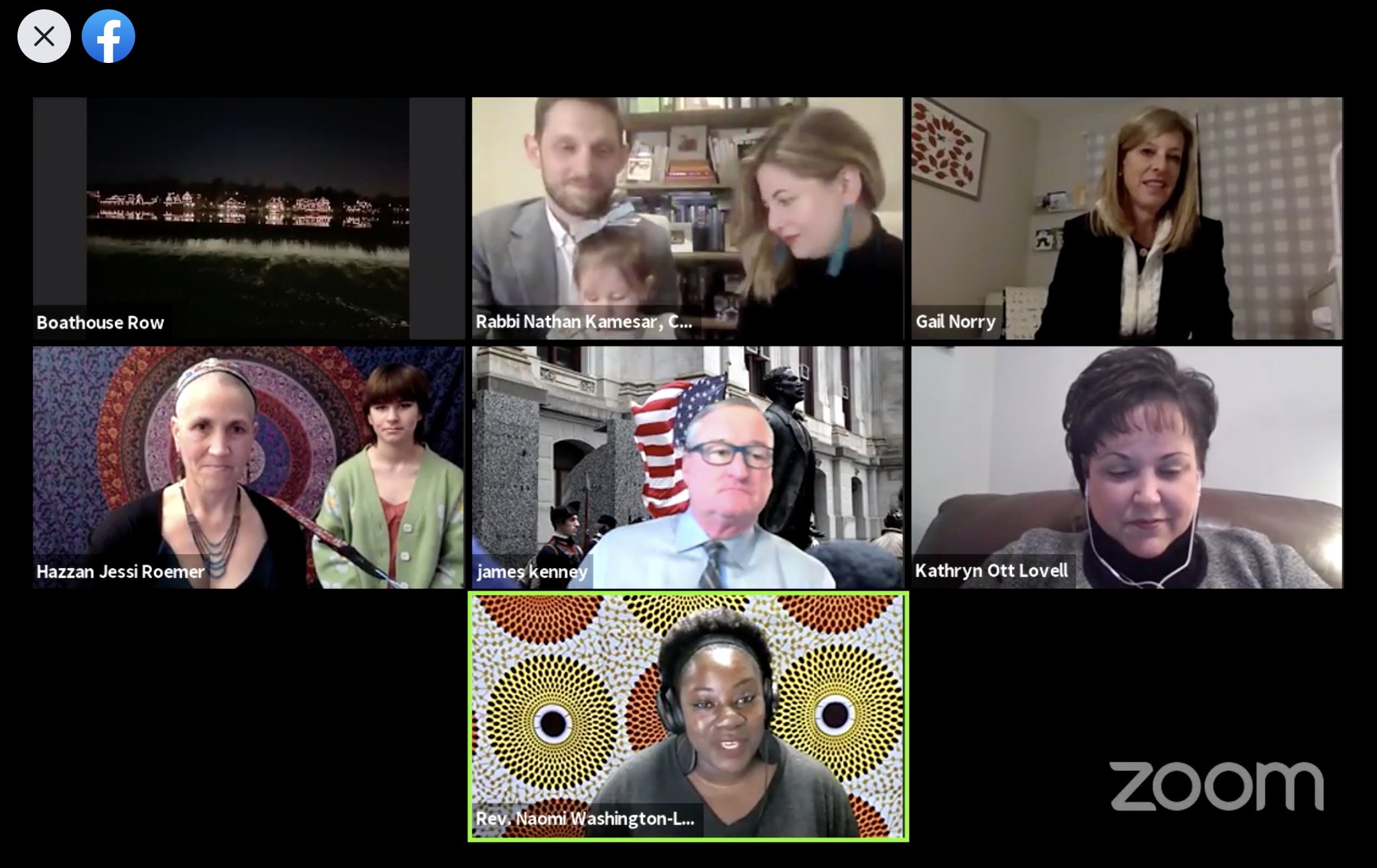
Hanukkah Lighting on Boathouse Row
The Mayor's Office of Public Engagement hosted their Hanukkah lighting on Zoom and shared it via Facebook Live. -
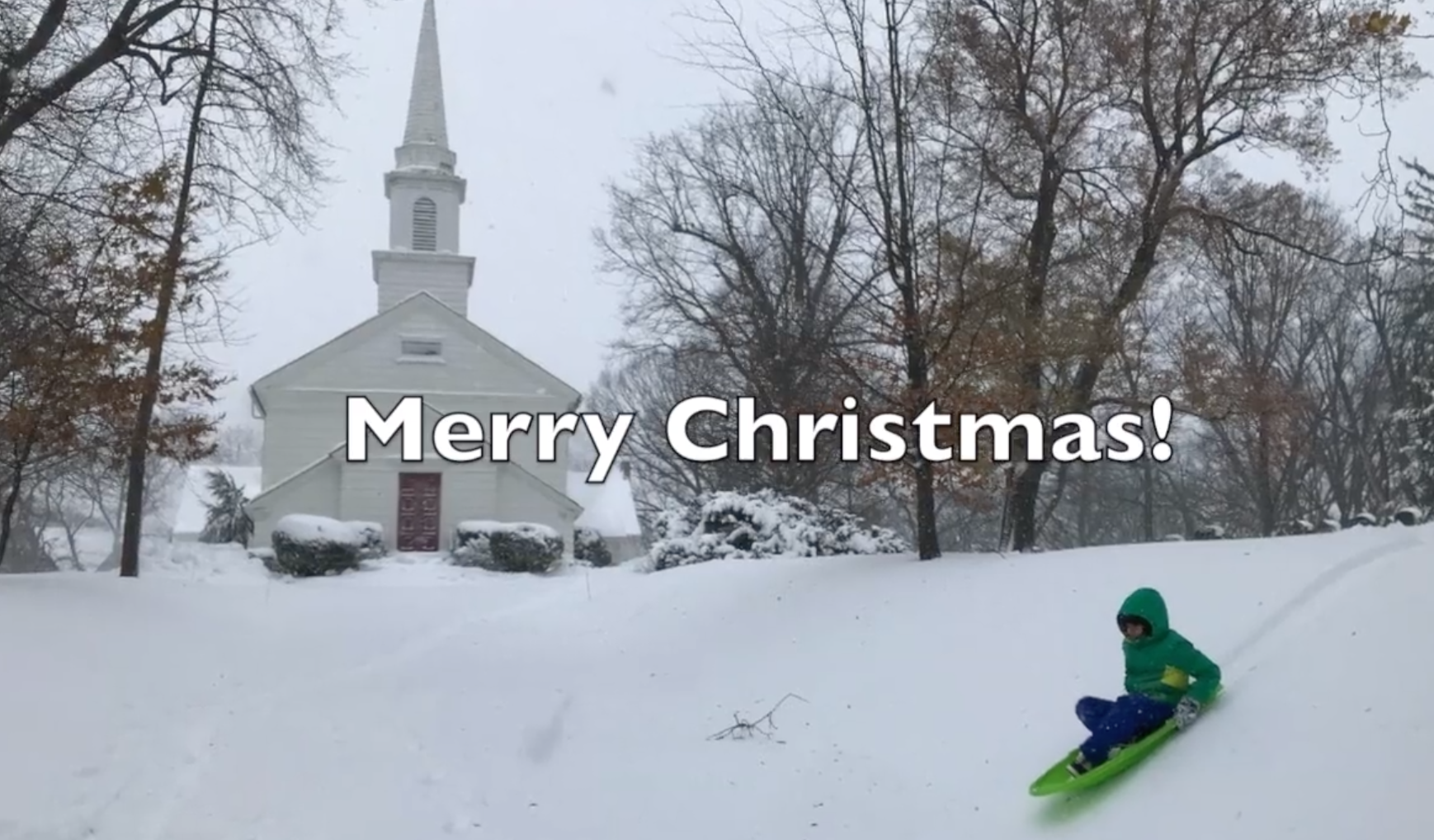
"Zoom in the Inn" Christmas Pageant at Zion Episcopal Church
We humbly present our 2020 Christmas Pageant "ZOOM IN THE INN." This year, parents filmed their children acting out their parts at home, and we knit all those little videos together into this pageant. We hope it makes you smile, and reminds you that wherever you are, you are never alone. Our God is Emmanuel—"God WITH us." Help us spread the good news—please share! Thanks so much to all the families who got creative with us as we told this sacred story in a new way! This is what Zion is all about. Like Mary says, "God is doing a new thing, and we're a part of it!" -
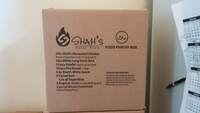
Food Security during Ramadan
Food boxes that were provided by local mosques and funded through nyc government. These specifically are labeled Halal but there were many options. -
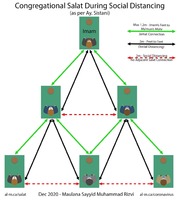
Shi'a Islam, digital collectives, and covid-19 outreach
As an early-career anthropologist of religion, I was conducting ethnographic fieldwork among the Twelver Shi’a denomination of Islam in the Pakistani city of Lahore when the COVID-19 pandemic struck. In the short two-month project I was working on, I was engaged in learning more about new digital proselytization networks established in Pakistan. Building on the work of marketplace producers of Shi’a religious media, these networks deployed existing social media platforms such as Facebook Live, YouTube, and WhatsApp to create a regular calendar of blended on- and offline events which closely resonate with existing theologies of mediation and co-presence richly in evidence in Pakistani Shi’a faith. When I left Pakistan in early March 2020, I was able to continue this research remotely at the same time as expanding my fieldsite to similar digital collectives in parts of the world with large diaspora communities of Urdu-speaking Shi’a of largely Indian, Pakistani, and Tanzanian origin. This included the online activities centred upon the Islamic Shia Ithna-Asheri Jamaat of Toronto (ISIJ) in Canada, which as a physical member community comprises around 5000-7000 people, but whose online activities have a much wider reach. Not only is it the most lavishly adorned mosque in the Greater Toronto area, but its outreach activities include the Jaffari Community Centre, equipped with a gym, banquet hall, and classrooms, and a fully-functioned “Watch Live” facility on their website and YouTube channel, the latter of which also includes archived recordings in both English and Urdu. I had been familiar with the ISIJ for some time through the engaging and charismatic sermons of the ISIJ’s Maulana Syed Asad Jafri. I find Jafri’s English-language majlis-e-aza [mourning gathering] sermons on each of the first ten days of the Islamic month of Muharram, the most engrossing in the language. During the pandemic I watched as the Jaffari Community Centre established a wide range of resources, under the headings, “Nurture the Soul”, “Contact Resources”, and “Educational Fun”. The first heading featured (at the time of writing) a 19-video series titled “Spiritual Check-up”, led twice-weekly by Maulana Syed Muhammad Rizvi on topics that the community are encouraged to reflect upon. The ISIJ also established a COVID-19 Taskforce which held regular live-streamed panel and Q&A sessions through which viewers could feed back directly through the interactive presentation software Menti. Among the wider Canadian Shi’a (Twelver, Ismaili, and Bohra) community, Facebook pages centered around religious television networks provided an opportunity for users to post visual material with the active encouragement that they be shared widely. As I observed among digital proselytization networks in Pakistan, the sharing of visual material on one’s feed or among one’s WhatsApp contacts carried with it the possibility of gathering blessings and increasing the potential efficacy of one’s prayers. A small sample of these COVID-19-specific materials shared among Canadian Shi’a are attached with this entry. A number of these written in Urdu and shared widely between Canadian worshippers and family and friends in Pakistan are briefly summarised and translated below. 1. A diagram showing congregational salat [prayers] during social distancing, produced by Al-Maarif Foundation, a Canadian Shi’a Ithna ‘Ashari publisher. The diagram was produced by Maulana Sayyid Muhammad Rizvi after sending a question to Ayatullah Sistani's office in Najaf, Iran, regarding the utility of a diagonal connection in congregational prayer during COVID-19. 2. The split image shows two sides of a morally responsible Shi’a subject. On the left-hand side, a young man is shown wearing a mask outdoors. On the right side he is shown undertaking a pilgrimage, likely to the mausoleum of Imam Hussain in Karbala in Iraq. Below the English text, a caption reads in Urdu: “Wearing a mask keeps azadari and azadars safe. This is your legal, national and moral duty.” The word azadari refers to the doing of ritual mourning for Imam Hussain and the ahl-e-bayt who suffered death or humiliation at the Battle of Karbala in 680AD. The word azadar refers to one who does azadari; a ritual mourner. 3. With a similar guiding message of “Save Azadar, Save Azadari”, this image carries an embedded invitation to share widely. The Urdu transliterated text reads: “For all azadars the use of a mask is compulsory. The management will not allow anyone to participate without a mask.” In its journey between users the image was often accompanied by the hashtags #ResponsibleAzadar #saveazadar #saveazadari 4. Depicting a masked pilgrim wearing a devotional green headband, the image is captioned in Urdu with the words, “Hussain ibn Ali said ‘Any individual who sheds even a single tear for our troubles will be rewarded by Allah with a place in heaven”. Shared widely on social media, the image was often pegged to the hashtags #SaveAzadariSaveAzadar #DefeatCoronaSaveAzadari. 5. The global, inter-faith day of fasting referenced in this image was also referred to by other contributors to the Pandemic Religion archive, particular a number of Mormon contributors. 6. This image, shared widely on social media, was captioned in English with the words, “How is separation, what is called suffering? Ask those people who are deprived of visits”. The use of the English word “visits” likely acts as a translation of the Arabic/Persian/Urdu expression ziyarat, when describes an act of pilgrimage, usually to a shrine or mausoleum. -
Personal Religious Experience -Jacob Miller
I'm a sophomore in college at the University of Missouri and quite honestly religion has been one of the biggest changes for me since the pandemic started. When I'm not in school I live in a small town in Southwest Missouri, and when the pandemic began and the first quarantine started, my church didn't take it very seriously, we weren't required to wear masks or distance ourselves or anything of the sort. About 3 weeks later a member of our church staff tested positive, resulting in the entire building being shut down for a number of weeks. When it finally reopened things just were not the same, the entire "social" side of going to church was hardly there at all. It kind of felt like going to a class, we all just had to sit there and listen without being able to greet other people. Along with this, ever since I can remember there is always about a 5 minute period in which you're able to walk around the room and say hi to friends and family before the sermon started. This was taken away, and the result is a hollow shell of a church, especially compared to what it used to be. I personally hope that this tradition picks back up after it is safe to do so because it's sad to see how harshly it's affecting the church. -
I haven't gone to Church since March but my grandfather still goes twice a week.
I haven't gone to Church since I was first sent home from college in March when lockdowns began. I feel guilty because as soon as the strictest lockdown for my area was lifted my 80 year old grandfather started going back to Church. He also goes to veneration every week. At first my family was worried about him and my grandmother but they never once got sick going to mass. After all these months my grandfather contracted Covid a couple weeks ago but hilariously it wasn't from going out it was from a visit from one of my relatives. I am lucky in that I can laugh at the irony of that because the only symptom my grandfather showed was loss of taste. I understand how fortunate I am to have healthy grandparents whom were rather unaffected by the virus. I am praying for those who are not as lucky and have lost someone during this pandemic. -
Searching for my faith during the pandemic
Hello! I am a student at the University of Missouri and if anyone asked me if I had a faith before the pandemic, I would have laughed. Now, I am searching to see if I am able to put my full faith back into the Catholic church. I am taking a Religious Studies course this semester and by being able to talk about my religion and its history, it has made me realize that it might be something I should look into joining again. With the pandemic, every single person has seen a low moment because of the virus. If that is to loosing a job, a family member, or not being able to go outside because of fear, I have realized that having faith can help anyone through that. -
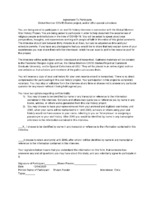
Chris Taylor's Digital Archive Project
All documents are uploaded as pdf forms, and the audio clip recordings of the three interviews are sent as mp3s. I have included the waiver for each person I interviewed, as well as both a transcription of the interview and an audio file. I also sent a brief analysis of my thoughts on the three interviews. The interviews share three people's reflections on the influence of COVID-19 within their religious communities, which include Catholic, Jewish and Mormon faiths. The project was done for a class with Patrick Mason at Utah State University. -
Exploring religion during a pandemic
I am a senior-year college student in Missouri and have decided to learn more about religion since Covid has given me an abundance of free time. I currently do not have any religious affiliations, but have recently felt a need to learn more about various religions. I have enrolled in a religious studies course at my college (which is how I learned about this website!) as well as done my own research. Due to the ongoing pandemic, I no longer feel the same sense of community at my college and have begun looking into other groups. I have been trying to find a religious group that aligns with my personal opinions and beliefs. I do not think I would have begun this journey of self-reflection if it were not for Covid. -
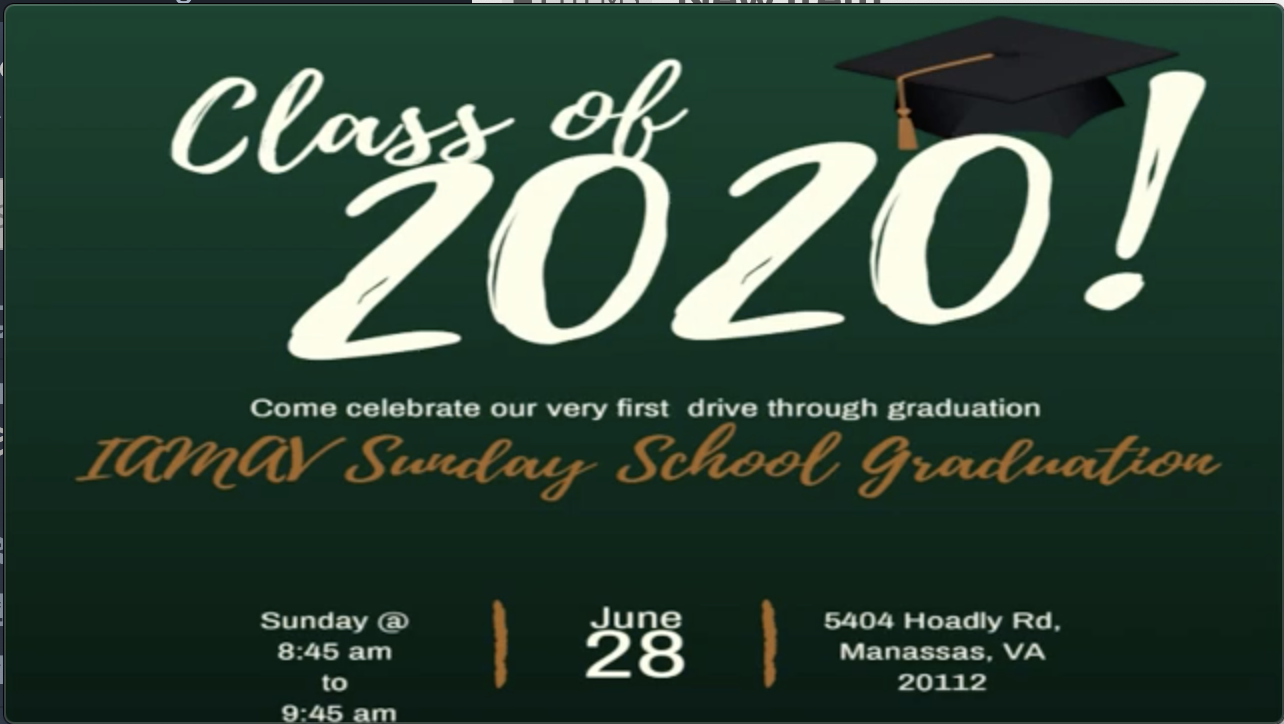
IAMAV Drive-Thru Graduation Day
Dar Al Noor celebrated its 2020 Sunday School graduates with a Drive-Thru graduation celebration -
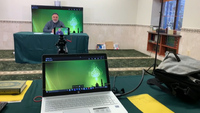
Virtual Programming
This collection of items show how Dar Al Noor shifted their regular programming, such as Sunday school and services, to a virtual format. They also held a virtual fundraiser. -
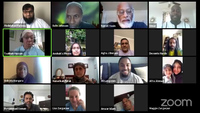
MAV ART Town Hall Meeting
Muslim Association of Virginia's Anti-Racism Taskforce's town hall meeting took place over Zoom -
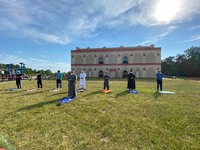
Outdoor Prayers
This collection of images and videos show how Dar Al Noor adapted its services to fit with social distancing guidelines -
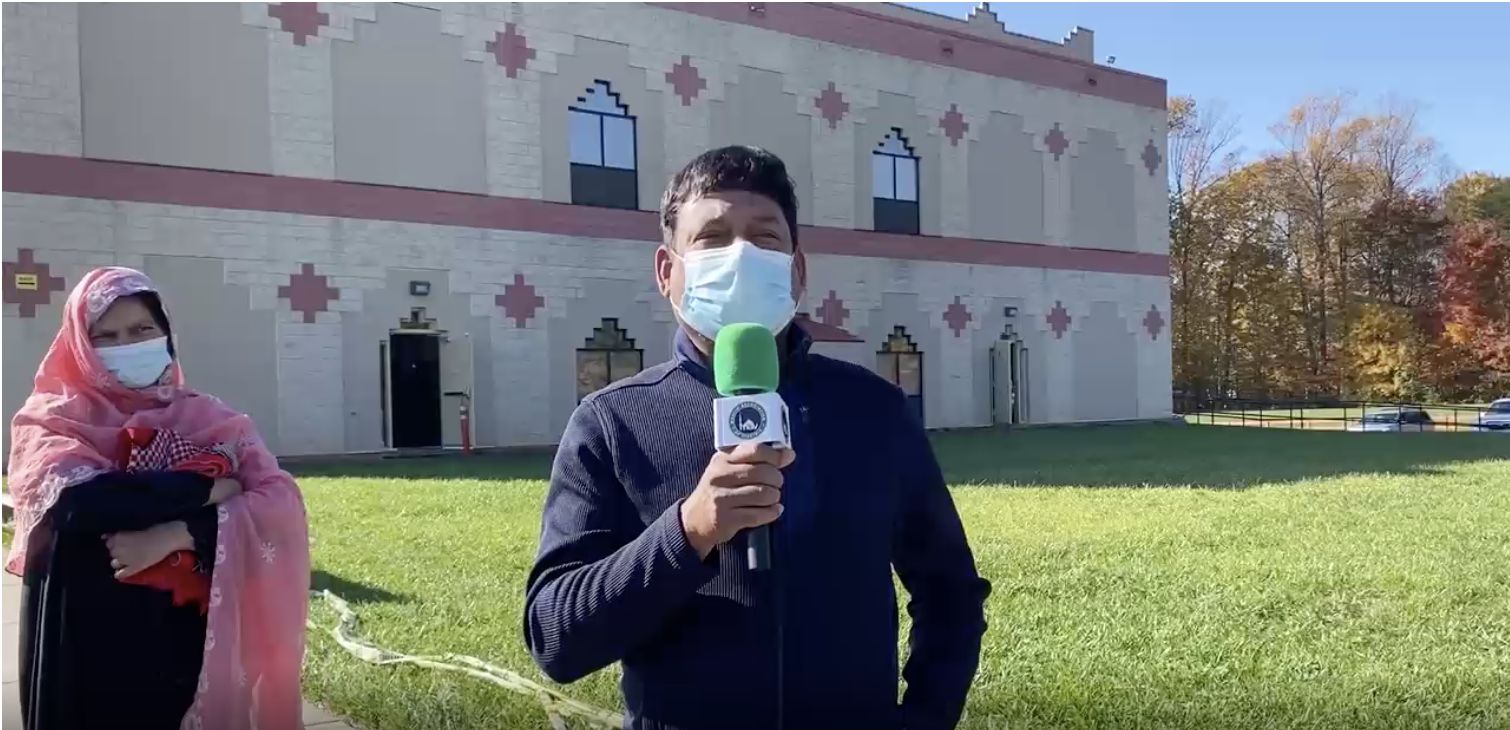
Interviews of Congregants
Dar Al Noor interviewed several of its congregants to talk about the ways the COVID-19 pandemic has affected them and their religious life -
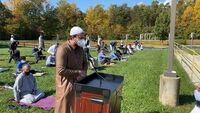
Jummah
Dar Al Noor adapted their Jummah to fit with social distancing guidelines -
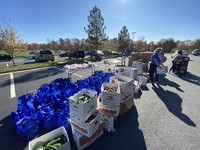
Food Distribution
These images show how Dar Al Noor came together to distribute food to their community, such as their bi-weekly food distribution and hot meals during Ramadan -
Finding Faith in a Family Room
I was sitting in my English class on March 12th when my friend walked in and said "Did you hear?" "Hear what?," I said. I soon found out that our church meetings had been cancelled worldwide until further notice because of COVID-19. We were shocked. Up until that point, the news of this foreign virus had seemed irrelevant to us. It did not affect us in any way because "It couldn't spread THAT much, could it?" In no way had it affected our lives up until then. Little did we know that the next day, we would receive word that school was cancelled for two weeks, then two more after that, and eventually, would move online for the rest of the school year. Little did we know that this virus would become a worldwide pandemic lasting up until December, and who knows how long beyond that, deadly in nature. My worship services, a huge part of my life and which I attended each week without fail, were greatly changed as a result of the coronavirus. Thankfully, we had been prepared for this. Over the past few years, the prophets and apostles of our church have re-emphasized the importance of building healthy habits of daily scripture study, prayer, and many other things along with strengthening a personal relationship with God. They had created a new and improved system to help you serve those around you, and encouraged everyone to check up on those assigned to them often. Finally, they had cut down the amount of time spent at church buildings each Sunday in order to place the focus more fully on the sacrament, where we remember Christ's sacrifice and renew our promises to him. As a result of these adjustments, among others, when meetings were cancelled, it made worshipping at home a much more comfortable change. If followed earlier, all of these habits were already implemented in your life. Priesthood holders were able to perform the ordinance of the sacrament at home. In my home, this was a very special experience. Each Sunday, we would all get ready and dressed in our Sunday best, and meet in the family room. We would sit on the couch and the bread and water would be set on a plate on the ottoman by the fireplace. We would sing, pray, and enjoy each others company. I felt that by being able to worship at home, with just my family, I was able to see things with a new perspective. I struggled during the first bit of quarantine to understand why everything was happening and what purpose it would serve to help me in my life, but I believe that part of that reason was so that I could strengthen my trust in and relationship with God. By not knowing what would come in the future, I had to believe that God would lead me where I should go, and that things would turn out as they should. I grew closer to Him and my family, and once church returned, I was even more grateful for it than ever before. -
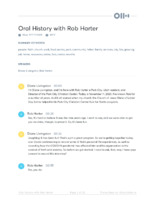
Oral History with Rob Harter
I am a graduate History student at Utah State University taking a course on Religious Special topics with Dr. Patrick Mason. For our final project, we were given the option to gather Oral Histories on religious people and their experiences with COVID-19. Rob Harter graciously agreed to let me interview him. He is the director of a Christian humanitarian center in Park City, Utah. I have included a pdf transcript of the Zoom call along with a link to the 50 minute video/audio interview. There are also a couple of photographs of him and the center. -
The Polish National Catholic Church
Men, women, boys, and girls frantically walk to and fro anxiously getting ready for the day. Mother and son, father and daughter dressed in their finest formal dresses and button-down shirts. As they prepare for their weekly hour renewing the presence of Jesus’s spirit into their souls, they walk to their living room, sit down on the couch, and open up the Facebook live stream on the PNCC. The pandemic has caused unfortunate circumstances to every individual, but for the Polish National Catholic Church community, it continues to make a dire situation worse. Finding a sense of community already proved to be difficult prior to the pandemic and now, being physically apart from each other, the feeling of community has worn down. However, with their devotion to their faith, they have succeeded in adapting to our world’s new normal. The PNCC’s Youtube channel includes all masses since the switch to online service. New services are uploaded at 7:00 am (EST) each Sunday on both their PNCC Liturgies Youtube page and the PNCC Facebook page. Most Rev. Anthony Makovsky, in St. Valentine Polish National Catholic Church located in Scranton, PA, begins the service singing a Christian hymn, which prior was sung by select members of the Church. Even towards the beginning of Mass, the consequences of coronavirus can be felt. The singing of hymns is usually one of the aspects that makes the parishioners feel united, so not doing it together harms their sense of community. Another part of Mass that was drastically changed was the sacrament of Eucharist. This specific sacrament plays a crucial role in PNCC worship, as the service is centered around it. During regular service, individual parishioners partake of a wafer (the body of Christ) and drink wine from a common cup (the blood of Christ). This ritual recreates Jesus's Last Supper and re-presents Jesus's death and resurrection to the gathered group of worshipers. Since online attendees cannot partake of the bread and the wine offered by the priest, a prayer is recited in place of this ritual act. The prayer’s words speak about hoping for Jesus to enter their bodies spiritually. For the relatively few parishes of the PNCC that decided to maintain in-person services, such as St. Valentine’s Church in Northampton, Massachusetts, health and safety precautions were enacted to limit the spread of the virus. Masks are mandatory for members attending the service, but the Celebrant and other ministers do not wear masks to keep the service “natural”. Because of this, they stand apart from other people as much as possible. The pews are regularly disinfected, and loose objects such as the bibles and the holy water at the front of the church are removed to limit contact. First Communion is still held, but the minister enacting the ceremony is required to wear a mask, and audiences are reduced to only the person receiving or giving communion and parents. Prior to the pandemic, the PNCC struggled with the falling membership numbers. This decline has been steady since the 1960s. It may be that the PNCC will see lower attendance in a post-pandemic world. Only time will tell. Although many major seasons of the liturgical year were held online, including Lent and Easter, hope remains for the upcoming Advent season to be held together in-person, as a united front. One of the biggest occasions for the Christian faith is the celebration of Jesus’s birth which is usually celebrated with family and friends. Food, laughter, joy, and sounds of Christmas hymns surround the Church for the four Sundays of Advent. With the pandemic, it might be difficult to celebrate amongst each other. However, the PNCC has stood and overcome tough times before because of their devotion to the community that they built. As the Prime Bishop, Rev. Anthony Makovsky emphasizes during his online homily on October 18, 2020, “Family is everything. We can find family and community with each other”. Because of the Polish National Catholic Church’s resilience and hope for the future and each other, they have a chance of adjusting to our world’s new normal. -
My Prayer Growth During Covid-19
When the coronavirus first began I had a lot of questions, as to why is this happening and now? But we are many months into this pandemic and I realized earlier on that I would need to create some habits that would allow me to bring peace of mind to myself and help with anxiousness. I had come across an article from Oprah Magazine when coronavirus began and it discussed how faith is helping people get through this pandemic. I had not been active in my faith, as much as I had wanted to be when Covid-19 first began, but I can happily say now that my faith has allowed me to feel more grounded in these times. I attended a few virtual masses but the most important part of my faith that kept me grounded was prayer. Through prayer I felt more of an ease at mind thinking about coronavirus. There is a lot of confusion in the world as to why did this happen, why would God do this? But through prayer I felt connected and less anxious about the pandemic. I prayed that people are doing okay and finding their way amongst this pandemic, and I pray for the families who have lost loved ones, but I am hopeful there are many good things that will come from this year. One thing I am very grateful for is the amount of time I have got to spend with family members and with myself. I have had time that I have never gotten before to take tasks slower, enjoy more conversations with the people you love and dive into more hobbies you have never gotten around to. I would have not had this time if I did not go home once the coronavirus just began. Being at home and surrounded by family has allowed me to create many new memories I will cherish. Through this pandemic, prayer has been my rock. I pray many times each day for the world to heal, for grieving families to feel loved in these times of heartache, and for everyone's happiness. Because I believe through this all, it will get better.